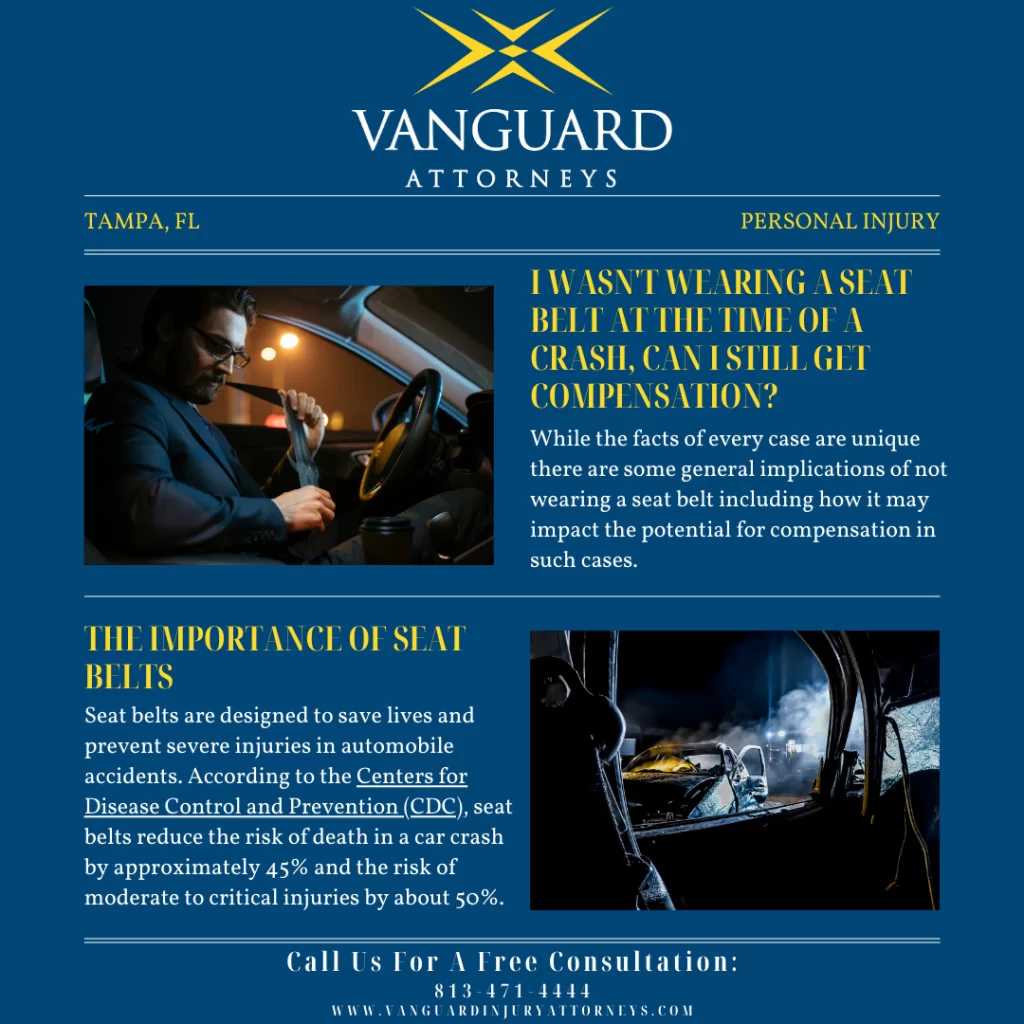Can I Still Recover Compensation If I Wasn’t Wearing A Seat Belt?
Get a Free ConsultationSeat belts are a critical safety feature in vehicles, designed to protect occupants in the event of a crash. However, there are situations where individuals may not be wearing their seat belts at the time of an accident.
If you were involved in a crash in the Tampa Bay area and weren’t wearing a seat belt, you may want to ask a Tampa car accident lawyer if you are still eligible for compensation. While the facts of every case are unique there are some general implications of not wearing a seat belt including how it may impact the potential for compensation in such cases.

The Importance of Seat Belts
Seat belts are designed to save lives and prevent severe injuries in automobile accidents. They restrain occupants, preventing them from being thrown forward or ejected from the vehicle upon impact. According to the Centers for Disease Control and Prevention (CDC), seat belts reduce the risk of death in a car crash by approximately 45% and the risk of moderate to critical injuries by about 50%.
Legal Implications
Florida, where Vanguard Attorneys is located, is a primary enforcement state, meaning law enforcement officers can stop and ticket motorists solely for not wearing seat belts. Seat belt laws vary by state, but most states have mandatory seat belt laws that require drivers and passengers to wear seat belts while the vehicle is in motion. If you are outside Florida, check your local laws to determine whether you live in a primary enforcement state.
It is essential to note that not wearing a seat belt can have legal implications in a personal injury claim. Insurance companies and opposing parties may argue that your failure to wear a seat belt contributed to the severity of your injuries.
Modified Comparative Negligence
In some cases, if you were not wearing a seat belt at the time of the accident, it may be considered negligence on your part. Negligence is a legal concept that assigns responsibility for an accident or injury. However, Florida now follows the legal principle of pure comparative negligence.
Modified comparative negligence allows injured parties to seek compensation for their damages even if they were partially at fault for the accident. However, the compensation may be reduced proportionately based on the degree of their fault. For example, if a court determines that you were 20% at fault for not wearing a seat belt, your compensation may be reduced by 20%. In 2023 Florida moved from a pure comparative negligence standard to modified comparative negligence. This means if a plaintiff is more than 50% at fault for their own injuries they cannot recover damages.
Impact on Compensation
Not wearing a seat belt can potentially impact the compensation you receive in a personal injury claim. Insurance companies and defense attorneys may argue that your injuries would have been less severe or preventable if you had been wearing a seat belt. They may try to use this argument to minimize the amount of compensation they are willing to offer.
However, it is crucial to remember that each case is unique, and the specific circumstances surrounding the accident and your injuries will play a significant role in determining compensation. Consulting with an experienced personal injury attorney can help you understand the potential impact of not wearing a seat belt on your claim and how to build a strong case for compensation.
Seek Legal Guidance
If you were involved in an accident where you weren’t wearing a seat belt and suffered injuries, it is crucial to seek legal guidance from a reputable law firm like Vanguard Attorneys. We have extensive experience in handling complex personal injury cases and can evaluate the specifics of your situation.
An attorney can help gather evidence, assess liability, and negotiate with insurance companies on your behalf. They will work to ensure that you receive fair compensation for your injuries, considering all relevant factors, including the impact of not wearing a seat belt.
While wearing a seat belt is essential for personal safety, not wearing one at the time of an accident does not automatically disqualify you from seeking compensation. The legal implications and impact on compensation may vary based on the specific circumstances and the state’s laws. If you find yourself in this situation, call us to discuss your options. Our experienced car accident attorneys will guide you through the legal process, protect your rights, and help you pursue the compensation you deserve.
